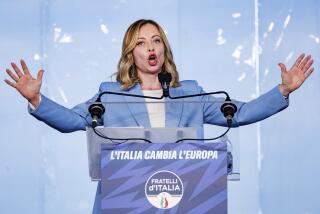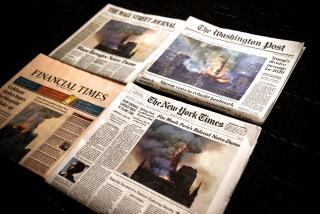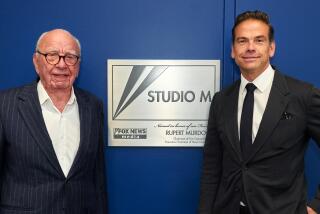EUROPE : Italy’s Political Tumult Spills Into the Newsroom
- Share via
ROME — At first blush, the clash between the grand old man of Italian journalism and the media mogul who is one of Italy’s richest men is a textbook encounter of free press vs. corporate pressure.
But the falling out of politically ambitious tycoon Silvio Berlusconi and editor Indro Montanelli has another prism: It is emblematic of an emotional free-for-all that marks Italy’s quickening search for leadership. Landmark spring elections will bring new parties into being and new faces into power after nearly half a century of political monopoly.
The spare, outspoken Montanelli, a legendary editor who is the country’s most revered and politically acute octogenarian, resigned this week from the conservative Milan daily Il Giornale, which he founded in 1974.
Berlusconi, who controls the newspaper through his brother Paolo, turned up last weekend at the respected but financially ailing Giornale demanding support, charges Montanelli.
“He shouldn’t have come here among my journalists asking them to take a stand,” said Montanelli, who prizes his independence. “He told them, ‘If you fight this battle against the left, you will not lack the means.’ ”
Berlusconi--whose media holdings include three national TV channels, racks of magazines, publishing houses and Italy’s largest advertising agency--says he entered politics two months ago because there are “no figures authoritative enough to be a rallying point for the real majority in this country.”
Berlusconi proposes himself as a magnet for centrists hoping to head off a leftist victory in a spring vote following recent electoral reform. Forza Italia, his new movement, is called, “Go, Italy,” after a national sports war cry particularly evocative for Berlusconi, who owns Milan, one of the world’s most famous soccer teams.
“Until a few months ago he never interfered” with the newspaper, Montanelli said on his way out the door. But things changed once Berlusconi entered politics. “By now he considers enemies anybody who doesn’t share his rapture,” said Montanelli.
What has brought Berlusconi to politics is that Italy’s Christian Democrats and their centrist allies, who have controlled power in 52 governments since World War II, have been destroyed by scandal as part of a two-year kickback probe that has uncovered nationwide, institutionalized corruption. This has thrown the balance of power to the left, led by the former Italian Communist Party.
*
The Communists, denied any share of national power in four Cold War decades, have changed their name to the Democratic Party of the Left, are now officially social democratic and lead in the opinion polls. But, like Berlusconi, many wonder openly if Communist stripes have changed.
“The left parties are still tied to the same men with the same ideas and the same attitudes,” he has said.
Berlusconi is not the only one who thinks so. Mario Segni, a respected reformer who quit the Christian Democrats in disgust, seeks a center around a new movement called Patto per l’Italia (Pact for Italy).
In search of moderate backing that would make him a possible coalition partner, Umberto Bossi, bumptious leader of the Northern League, this week abandoned his bedrock call for creation of a federal Italy divided into three self-governing regions. Bossi now says he will settle for stronger regional autonomy.
For his part, neo-fascist leader Gianfranco Fini of the Italian Social Movement, narrowly defeated in Rome mayoral elections last month, is trying to build a national right-wing alliance.
Il Giornale supported Segni under Indro Montanelli. Now, change is in the wind there, but Montanelli’s voice is far from stilled.
In March, at age 85, Montanelli will launch a new Milan daily, La Voce, taking many journalists with him from Il Giornale. “Those who follow me will be free. Those poor souls who follow him (Berlusconi) will have money,” said Montanelli.
More to Read
Sign up for Essential California
The most important California stories and recommendations in your inbox every morning.
You may occasionally receive promotional content from the Los Angeles Times.













